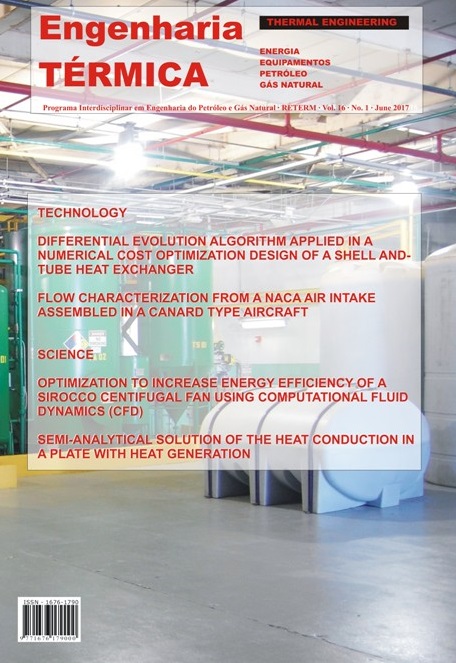DIFFERENTIAL EVOLUTION ALGORITHM APPLIED IN A NUMERICAL COST OPTIMIZATION DESIGN OF A SHELL AND-TUBE HEAT EXCHANGER
DOI:
https://doi.org/10.5380/reterm.v16i1.62185Keywords:
cost optimization, shell-and-tube heat exchanger, differential evolutionAbstract
Shell-and-tube heat exchangers are the most common heat exchangers that can be found in several industrial applications. The reduction of the investment cost and the operation of this equipment it’s one of main industrial designers and entrepreneurs aim. With the intention of reducing total costs of a shell-and-tube heat exchangers, as proposed by Caputo et al. (2008), employed in this present study the optimization technique called Differential Evolution (DE), which basically consists in a calculation mechanism, supported on operators of “crossing” and “mutation” differential, through mathematical and heuristics arguments that indicate your adequacy for function optimization. This study is defined as a mono-objective optimization problem and the total cost of a shell-and-tube heat exchanger is the objective function. To this, it was taken as a design variable intern diameter tube, the outer diameter of the shell and the spacing between baffles or deflectors. The results reached in this work were compared with the same problem when used GA (Genetics Algorithms), PSO (Particle Swarm Optimization), QPSO (Quantum Particle Swarm Optimization) and QPSOZ (Quantum Particle Swarm Optimization by Zaslavskii). Regarding the literature, the capital investment in the heat exchange reduces corresponding in 15.2% and consequently the depreciation charge of the equipment decrease approximately 12.5%. In general, the total cost of the shell-and-tube heat exchange in analysis, presented a reduction of 15%, showing the potential of applied method in this study, the technique DE.
Downloads
Published
How to Cite
Issue
Section
License
Direitos Autorais para artigos publicados nesta revista são do autor, com direitos de primeira publicação para a revista. Em virtude da aparecerem nesta revista de acesso público, os artigos são de uso gratuito, com atribuições próprias, em aplicações educacionais e não-comerciais.



